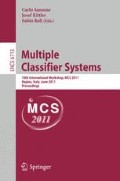Abstract
This paper proposes a method for constructing ensembles of decision trees: GRASP Forest. This method uses the metaheuristic GRASP, usually used in optimization problems, to increase the diversity of the ensemble. While Random Forest increases the diversity by randomly choosing a subset of attributes in each tree node, GRASP Forest takes into account all the attributes, the source of randomness in the method is given by the GRASP metaheuristic. Instead of choosing the best attribute from a randomly selected subset of attributes, as Random Forest does, the attribute is randomly chosen from a subset of selected good attributes candidates. Besides the selection of attributes, GRASP is used to select the split value for each numeric attribute. The method is compared to Bagging, Random Forest, Random Subspaces, AdaBoost and MutliBoost, being the results very competitive for the proposed method.
This work was supported by the Project TIN2008-03151 of the Spanish Ministry of Education and Science.
Access this chapter
Tax calculation will be finalised at checkout
Purchases are for personal use only
Preview
Unable to display preview. Download preview PDF.
References
Kuncheva, L.I.: Combining Pattern Classifiers: Methods and Algorithms. Wiley Interscience, Hoboken (2004)
Breiman, L.: Bagging Predictors. Machine Learning 24, 123–140 (1996)
Ho, T.K.: The random subspace method for constructing decision forests. IEEE Transactions on Pattern Analysis and Machine Intelligence 20, 832–844 (1998)
Freund, Y., Schapire, R.: Experiments with a new boosting algorithm. In: Proceedings of the Thirteenth International Conference on Machine Learning (ICML), pp. 148–156 (1996)
Webb, G.I.: MultiBoosting: A Technique for Combining Boosting and Wagging. Machine Learning 40, 159–196 (2000)
Breiman, L.: Random forests. Machine learning 45, 5–32 (2001)
Dietterich, T.G.: An experimental comparison of three methods for constructing ensembles of decision trees: Bagging, boosting, and randomization. Machine Learning 40, 139–157 (2000), doi:10.1023/A:1007607513941
Maudes, J., Rodríguez, J.J., Garcïa-Osorio, C., Garcïa-Pedrajas, N.: Random feature weights for decision tree ensemble construction. Information Fusion (2010)
Quinlan, R.J.: C4.5: Programs for Machine Learning. Morgan Kaufmann, San Francisco (1993)
Breiman, L., Friedman, J., Stone, C.J., Olshen, R.A.: Classification and Regression Trees. Chapman and Hall, Boca Raton (1984)
Feo, T., Resende, M.: A probabilistic heuristic for a computationally difficult set covering problem. Operations Research Letters 8, 67–71 (1989)
Feo, T., Resende, M.: Greedy randomized adaptive search procedures. Journal of Global Optimization 6, 109–133 (1995)
Pacheco, J., Alfaro, E., Casado, S., Gámez, M., García, N.: Uso del metaheurístico GRASP en la construcción de árboles de clasificación. Rect@ 11, 139–154 (2010)
Geurts, P., Ernst, D., Wehenkel, L.: Extremely randomized trees. Machine Learning 63, 3–42 (2006)
Hall, M., Frank, E., Holmes, G., Pfahringer, B., Reutemann, P., Witten, I.H.: The weka data mining software: an update. SIGKDD Explor. Newsl. 11, 10–18 (2009)
Nadeau, C., Bengio, Y.: Inference for the generalization error. Machine Learning 52, 239–281 (2003), doi:10.1023/A:1024068626366
Dietterich, T.: Approximate statistical tests for comparing supervised classification learning algorithms. Neural computation 10, 1895–1923 (1998)
Frank, A., Asuncion, A.: UCI machine learning repository (2010)
Demšar, J.: Statistical comparisons of classifiers over multiple data sets. The Journal of Machine Learning Research 7, 1–30 (2006)
Castiello, C., Castellano, G., Fanelli, A.: Meta-data: Characterization of input features for meta-learning. In: Modeling Decisions for Artificial Intelligence, pp. 457–468 (2005)
Ho, T., Basu, M.: Complexity measures of supervised classification problems. IEEE Trans. Pattern Anal. Mach. Intell. 24, 289–300 (2002), info:doi:10.1109/34.990132
Author information
Authors and Affiliations
Editor information
Editors and Affiliations
Rights and permissions
Copyright information
© 2011 Springer-Verlag Berlin Heidelberg
About this paper
Cite this paper
Diez-Pastor, J.F., García-Osorio, C., Rodríguez, J.J., Bustillo, A. (2011). GRASP Forest: A New Ensemble Method for Trees. In: Sansone, C., Kittler, J., Roli, F. (eds) Multiple Classifier Systems. MCS 2011. Lecture Notes in Computer Science, vol 6713. Springer, Berlin, Heidelberg. https://doi.org/10.1007/978-3-642-21557-5_9
Download citation
DOI: https://doi.org/10.1007/978-3-642-21557-5_9
Publisher Name: Springer, Berlin, Heidelberg
Print ISBN: 978-3-642-21556-8
Online ISBN: 978-3-642-21557-5
eBook Packages: Computer ScienceComputer Science (R0)

